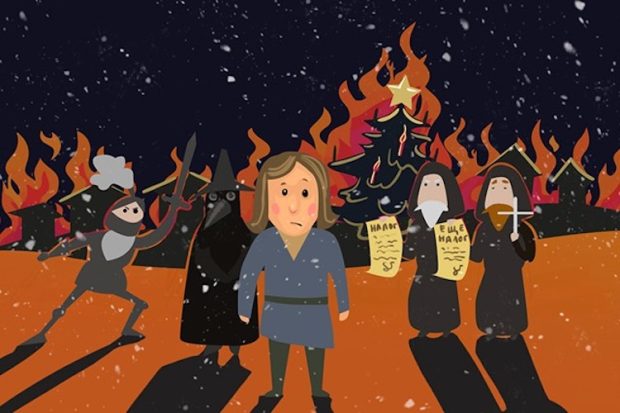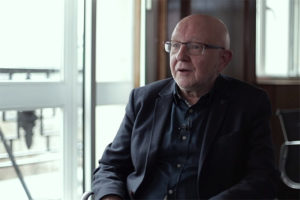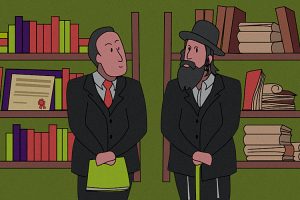Theory-Change and Scientific Realism
Professor of Philosophy of Science John Worrall on scientific revolutions, continuity of science, and the chan...
For my whole life, I’d been interested in humour and laughter. I’d always been interested in comedy; I wanted to make comedy when I was young. When it came time to do my research, my PhD, I was learning to be a scholar in the Middle Ages, the 12th and 13th centuries, and I was choosing other topics. I was interested in law and bureaucracy; I was interested in politics in different ways… One day, it occurred to me that humour has been the thing that has driven my interest for so long. Maybe I could put the two together, and maybe I could do a study of medieval humour.
For me, laughter is one of the most important things in communication. Someone did a study: apparently, every 20 seconds in any conversation, there’s laughter. It’s much more often than we think; we laugh all the time. Laughter is doing a lot of work; it’s doing a lot of communication work, obviously, but really, laughter is doing something else: it’s obviously part of power relations, it has politics attached to it, or it can have politics attached to it. It articulates who we are. For example, the recent Ukrainian election is a fascinating case study where the candidate who had been a comedian was elected president. What does this say about what laughter comedy can do as a form of politics? I think he answered a wonderful question: they said, ‘What do you have to say about Ukraine’s roads?’ And he said, ‘I have nothing to say because there are no roads’. It’s a good joke. Does it do something that a more formal answer to that question couldn’t do? I think it does; I think in that moment of laughing, we see something terrible if you like. Donald Trump in the United States gives us another example of a clown becoming a prince, where a clown can apparently do something more powerful or speak to people on a level that more rational discourse cannot. I’m not saying it’s a good thing at all; I’m just observing that sometimes laughter can be enormously powerful. It’s coming to bear.
It used to be said that laughter was always conservative, that what you’re doing when you’re laughing is you’re reducing things back to common sense. I’m laughing: ‘Ha! It’s ridiculous!’ It’s kind of saying that we should go back to something that isn’t ridiculous. But I think laughter can sometimes do something much more radical.
Laughter can sometimes make us reflect that, in fact, we are ridiculous, that the human itself is ridiculous, that we attempt to bring order to life: we dress up in suits, we pretend we’re reasonable people, but really we’re animals underneath it, some would say. Maybe laughter exposes us, reminds us about inner ridiculousness, that all attempts to bring order and measure and rule to our lives are futile because we’re laughable animals.
My problem or one of my concerns with doing medieval history was that we didn’t take account of the humorous moments, the parts where there’s deliberate irony, or where things aren’t as they seem. We rely solely on texts: all we know about the 12th or 13th centuries is textual. So I always had this anxiety that we were missing something; we were missing some layer of irony or humour or those little moments of relief if you like.
Generally speaking, there are three theories of laughter: of why we laugh and what laughter does. The first theory is superiority: this idea that we laugh when we come to recognize that we’re really superior to something. It’s a moment of sudden glory where we recognize that we’ve released ourselves from this, at least. In other words, there’s a butt of every joke, so you have to be mocking something. Another theory of humour is repression, Freud’s theory, the idea that laughter expresses our unspoken, unacknowledged desires, that every joke is like something within us that we want coming up, bubbling up through the surface. The third theory (the theory that interested me most) is incongruity: this idea comes from Henri Bergson in the late 19th-early 20th century in Bergson’s little book ‘Laughter’. And he says that laughter is really something ‘mechanical encrusted on the living’. What Bergson means by that is that we laugh in moments when we recognize something artificial, something which is restricting a kind of natural human life. This is silly in a way: what is natural human life? But I think there’s something in there. I think laughter is drawing attention to artificialities and incongruities. I think that’s a really interesting way to think about what laughter is.
My research looks at laughter in the 12th century, the 1100s, in Western Europe but mostly in England and France. It looks at laughter as revealing some kind of incongruity in how these states of England and France are operating. My interest is in the court of Henry II, the English king (1154-1189). This is a time when England (and Europe generally but particularly England) is undergoing this enormous change. Before Henry II was king of England, there was anarchy; it was a time of total chaos, there was a civil war, rule and order effectively didn’t exist, we had something like ‘bastard feudalism’. People were gaining what they wanted by force more than by procedure. Henry comes in, and he has this idea in 1154 that he’s going to restore the law and order that was in the time of his grandfather. In reality, Henry actually begins to innovate these new procedures that have never been there before, written mechanisms for law, for how you get justice, using archives for the first time in a really instrumental way. He introduces a series of other procedures, documentary procedures, formalizing the exchequer as a way of processing finances. So, all of these laws and mechanisms come in to regulate political life.
This is where laughter comes in, because my theory is that laughter becomes a shadow mechanism, laughter reveals the enormous tension, imposition of rule, order and procedure onto a previously fairly charismatic, anarchic political order.
What happens in the 12th century? My argument is that laughter suddenly becomes very powerful. People start talking about laughter as if it has some kind of enormous power: not just political power but almost, at times, supernatural power. What do I mean by this? Before this period, laughter really had diabolical associations, particularly in Christian writing. People don’t write about laughter as if it’s a good thing: they write about laughter as a weight upon your soul; the more you laugh, the more damned you are. Laughter is wicked in their view; laughter and humour are cruel; it’s a cruel sport, and it doesn’t serve a function. Speech makers should not laugh, kings should not laugh, and you should not mock a monarch. Henry I, Henry II’s grandfather, when he’s mocked (there was a mocking song about him), has the guy’s eyes gouged out. That’s the punishment for reckless laughter.

In the 12th century, laughter becomes very powerful; this whole thing is overturned: suddenly, laughter becomes a really positive thing. Monastic and theological writers write about laughter as if it has this spiritual power: if you’re having a mystical experience, you’re experiencing God’s presence within you, you may well laugh. Laughter expresses this moment of exhilaration. Rhetoricians talk about the virtue of making people laugh: not just to sweeten the message of a speech but also to kind of do some work so they’d process the idea; if you make people laugh, they will understand in a way that they didn’t before. Medical writers have also started talking about laughter as if it’s a good thing. Previously, laughter was a sign of an active spleen: there might be some disease in your body if you’re laughing too much, or maybe you’re having a manic attack. By the later 12th century – ‘Oh, laughter is a sign that you’ve got some good blood, your humour’s well balanced, it’s a positive sign of health’. That’s quite interesting.
In the 12th century, alongside those intellectual changes in how laughter is viewed, laughter became instrumental; it became a way of doing politics. So Henry II’s courtiers talk more and more about the value of laughter and humour as ways of getting things done. On a practical level, it’s fairly cruel: you can bring down your rivals through a well-timed joke, satire can expose corruption, and it can undermine your political enemies. So laughter is really useful in that way, humour is really useful in that way. But also, it does something a lot more; it comes to be valued as kind of a high-water mark of your virtue as a courtier. If you can make people laugh in the right way and if you can laugh yourself in the right way at the right things, then you can show your belonging to the highest echelons of court society. In many ways, it articulates your power. What does this mean? On the one hand, there are these jokes that circulate in these satirical writings; in Henry’s Court, his courtiers have this cachet. On the other hand, a lot of the humour is itself extremely elite, so you’re laughing at Latin puns, you’re laughing at the rustic speech of people who don’t really fit in the court society. That humour is a way of marking out the boundary.
But more than that, it’s a way of winning favour with the most powerful people, with the king and the king’s close familiars. There are a couple of examples of that. Roger of Worcester spends his entire career doing all sorts of things, sailing too close to the wind; he takes his power beyond what he should have as a courtier. He’s almost acting like a king himself, but he gets away with it because he makes the right joke at the right time, and everything is forgiven.
The culmination of this 12th century’s power of laughter is with the king himself. My theory is that in the 12th century, we got the birth of this image of this Laughing King, laughing kingship. It’s a new kind of kingship. Scholars have looked at this before; they’ve said, ‘Laughing kingship is kind of a mode’, but for me, it’s a real political mode; it’s something that gets something done that could not otherwise be done. It’s not just an image of a king’s benevolence: the Laughing King is someone who does something that the Serious King cannot.
What the Laughing King does is he manages to absorb the laws, to work with the new governmental laws of bureaucracy and codes in political society but also move beyond them. He’s someone who’s able to create a state of exception which allows procedure to run but also supersedes it.
What do I mean by that? Henry II, as laughing king, is someone who, as I’ve said, instils a whole range of laws throughout the land. So there are new mechanisms: if someone invades your lands, you now have a legal right, a procedure whereby you, the claimant, can get that land back. Henry II, however, uses laughter as a way to supersede this. When someone comes to him and says, ‘My son has dispossessed me of my land, my son is a knight, and he wants my land, I was off somewhere else, and he’s invaded, and now he’s inherited before I’m dead’. This was actually legal; it was within the bounds of the mechanism under Henry II. But Henry takes sympathy, and even though this is the law, he laughs at this: ‘It’s so funny that this has happened: he’s inheriting before you’re dead. ‘ And he says: ‘You know what? We’re gonna waive the law in this circumstance’ and use his sovereign authority to make a state of exception and reinstate the claimant’s land. This is just the kind of thing that laughter represents: it represents this moment of rapture where the law and procedure are superseded, and the sovereign’s authority appears in its naked form.
There are many other examples of this. Another famous example is when Henry II finds two drunkards who have been drinking all of the wine in his wine cellar. It’s his private collection; he’s appalled. And these two drunkards have been bought before him, and apparently, they’ve been slandering his name; they’ve been slagging off the king as well. And they’re asked to explain themselves: ‘Why did you do this? Explain yourselves!’ And they said: ‘Look, we said some terrible things, but it’s nothing to what we would have said if you’d let us finish all the wine’. This is a joke, and the king laughs; he really loves this joke, and he lets them off. So they have managed to use their wit, the king himself is dissolved in laughter, and at that moment, the law is meaningless, or it’s maybe not meaningless but is suspended, and the sovereign’s naked power appears again.
That’s one thing. The other thing that my research has been looking at is how laughter itself seems to have power. It seems to be able to express something within the human which is transcendent; it seems to take the human outside of the normal sphere of operation. Laughter seems to represent that moment of ecstatic release, and this translates into the spiritual sphere. The 12th century also sees the emergence of the Laughing Saint as a motif: this idea that saints at the moment of high exhilaration, at the moment that a saint is martyred, or a moment a saint has a prophetic vision or a moment that a saint performs a miracle there’s laughter. The laughter that is able to express that ineffable sphere of operation or that ineffable power that simple words cannot. Laughter can express something divine.

Professor of Philosophy of Science John Worrall on scientific revolutions, continuity of science, and the chan...

Shlomo Izre'el on the myths about the Hebrew language, its relations with Yiddish, and how children teach thei...

Professor of German Studies Rudolf Simek on the Vikings' nomadic life, their cultural achievements, and the en...